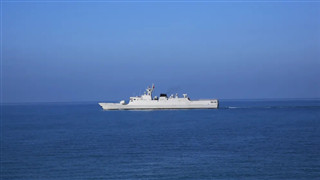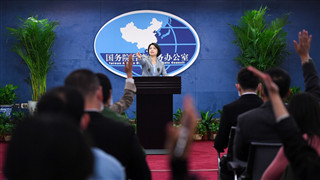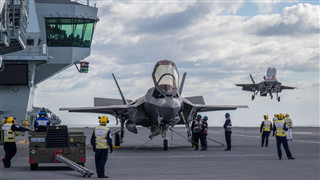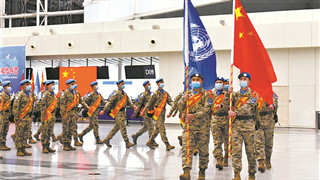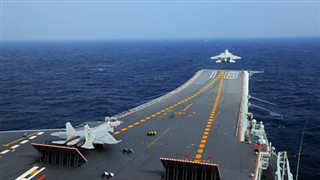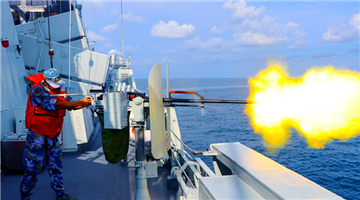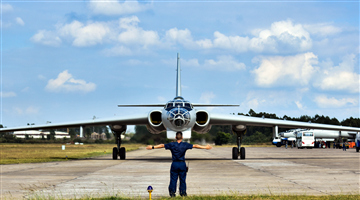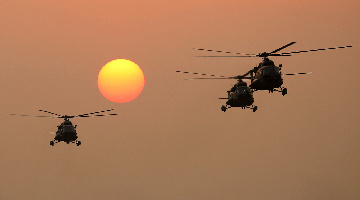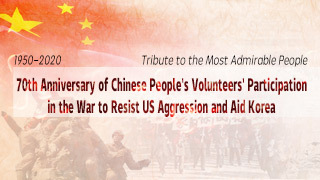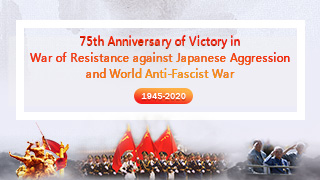By Senior Colonel Wu Qian, Director General of the Information Office of the Ministry of National Defense (MND) and Spokesperson for the MND

(The following English text of the press conference is for reference. In case of any divergence of interpretation, the Chinese text shall prevail.)
Question: President Xi Jinping delivered an important speech at the meeting marking the 70th anniversary of the Chinese People’s Volunteers’ entering the Democratic People’s Republic of Korea (DPRK) to fight in the War to Resist U.S. Aggression and Aid Korea on October 23. Currently, the world is undergoing profound changes unseen in a century. Against the backdrop, how should we understand the significance of President Xi’s speech?
Answer: President Xi Jinping, also general secretary of the Communist Party of China (CPC) Central Committee and chairman of the Central Military Commission (CMC), attended the meeting marking the 70th anniversary of the Chinese People’s Volunteers (CPV) entering the DPRK to fight in the War to Resist U.S. Aggression and Aid Korea and delivered an important speech on October 23. In his speech, President Xi comprehensively reviewed the great victory and remarkable contributions of the War to Resist U.S. Aggression and Aid Korea and profoundly interpreted the historic significance and practical value of the great spirit forged during the war. He also incisively revealed the historical lessons brought about by the war, and demonstrated China’s firm stance and resolve to protect territorial sovereignty and unity, safeguard regional and world peace and stability, and promote the building of a community with a shared future for mankind.
First, we must carry on the great spirit forged during the War to Resist U.S. Aggression and Aid Korea from generation to generation. During the war, the heroic CPV had always upheld patriotism by placing the interests of the motherland and the people above all and defying personal danger to safeguard the dignity of the motherland and the Chinese nation. They had always upheld revolutionary heroism with their bravery and acts of valor. They had always upheld revolutionary optimism by demonstrating high morale despite hardships and difficulties. They had always upheld revolutionary loyalty by sacrificing themselves to complete missions assigned by the motherland and people. They had always upheld internationalism by striving for the cause of peace and justice of humanity. The great spirit forged during the war is a "precious spiritual wealth" that will inspire the Chinese people and the Chinese nation to overcome all difficulties and obstacles, and prevail over all enemies.
Second, a war must be fought to deter invasion, and violence must be met by violence. A victory is needed to win peace and respect. It is necessary to speak to invaders in the language they know. Only those capable of fighting can stop battles, and only those prepared for war don’t have to fall into war, while those incapable of fighting leave themselves vulnerable to attacks. This is dialectical relationship between war and peace. We always need to forge and uphold a national spirit of fearing no violent oppression and fighting hegemony. The Chinese people do not stir troubles, but we never flinch when trouble comes our way. We will never bow to difficulties or risks and the Chinese nation will never cower before threats, or be subdued by suppression.
Third, justice will prevail at last, and peace and development are unstoppable trends of the times. Those who follow it will prosper, while those who resist it will perish. The hard facts have shown that any country or military, no matter how powerful it is, will definitely end in failure if it goes against the trends of development, bullies the weak by force, launches aggression or seeks expansion. Though the smoke of the war has dispersed, our world remains far from peaceful. China always pursues a defense policy that is defensive in nature. The Chinese military is always a staunch force for world peace. China never seeks hegemony or expansion and firmly opposes hegemonism and power politics. We will never sit idly by and allow our national sovereignty, security and development interests to be damaged, nor will we allow anyone or any force to invade or separate the sacred territory of our motherland. Once such a grave situation happens, we will give invaders and enemies head-on blows.
We will unite more closely around the CPC Central Committee with Comrade Xi Jinping as the core and carry forward the great spirit forged in the War to Resist U.S. Aggression and Aid Korea. We will maintain a high morale, have both the courage and wisdom to fight, and overcome difficulties with resilience. We will stay committed to the great cause of building a strong country and military in the new era, and contribute our wisdom and strength to realizing the Chinese Dream of national rejuvenation and building a community with a shared future for humanity.
Question: President Xi Jinping inspected the People's Liberation Army Navy (PLAN) Marine Corps recently. He urged the Marine Corps to focus on military preparedness and combat capabilities, and maintain a high level of readiness. What measures has the Marine Corps taken to implement the instructions by President Xi? Can you tell us more about this force?
Answer: On October 13, President Xi inspected the PLAN Marine Corps and delivered an important speech, in which he gave full recognition to the Marine Corps on its development and task fulfillment since its reorganization, and provided strategic guidance, approaches and key areas for accelerating the transformation of the force. The Marine Corps has carefully studied President Xi’s speech, planned its development paths accordingly, and put its focus on strengthening training, combat readiness and capabilities. First, it will refine the top-level design, highlight its own characteristics and further clarify its goals, directions, paths and priorities. It will also step up research in multi-dimentional, maritime and overseas force employment. Second, it will enhance the core capability of joint landing operations centered on the goal of “multi-function integration, fast response and multi-dimentional employment”, and temper the forces in challenging situations and with stringent standards. Thirdly, it will promote innovations in combat theories, training modes and task formations, enhance the integration of combat forces, units and elements and strengthen its coordination and integration with other services and arms, so as to be an integrated part of the joint operations system.
The PLA Navy Marine Corps is an elite combat force for amphibious operations reorganized and established in 2017. It shoulders the important duties of safeguarding the country's sovereignty, security, territorial integrity, maritime interests, and overseas interests. In recent years, the PLAN Marine Corps has stepped up its transformation, improved combat capabilities, and has effectively carried out diverse operations in different strategic directions, battle environments and mission areas. It has performed vessel-protection missions at the Gulf of Aden in waters off the Somali coast, joined the emergency mission of evacuating Chinese and foreign nationals from Yemen, and participated in joint exercises, training and competition with foreign counterparts, proving itself as a force with great military skills, fine conduct and good image.
Question: American media reported that the US is studying plans of using MQ-9 Reaper drones to attack China’s islands and reefs in the South China Sea when President Trump is faced with unfavorable situation in the presidential election, so as to create a so-called “October Surprise”. What is your comment on this?
Answer: US Defense Secretary Mark Esper has clarified on this to the Chinese side through military and diplomatic channels, saying that relevant reports are not consistent with facts, and the US side has no intention of creating a military crisis against China. He said that the US side is willing to build a stable, constructive, and result-oriented mil-to-mil relationship with the Chinese side, and establish necessary mechanisms to mitigate risks, strengthen communication and cooperate in areas of common interests.
We believe that maintaining communication between the two militaries is very important under the current circumstances. We urge the US side to keep their words and match their deeds accordingly, take effective measures to stop military provocations in the sea and air spaces around China, and stop actions undermining China’s core interests and major concerns. Should anyone dare to stir up a maritime conflict, the Chinese side will fight back resolutely to safeguard national sovereignty and security interests. We hope the two sides will work towards the same goal, strengthen communication, manage risks and strengthen mutual trust to prevent misjudgment, and push the bilateral relations back to the right track of coordination, cooperation and stability.
Question: Some comments say that the current China-US relations are facing multiple challenges. As the COVID-19 pandemic continues to wreak havoc around the world, can the China-US military exchanges proceed as normal? Please brief us on it.
Answer: The China-US military relationship is an important part of the bilateral relations. It is in both sides' interests and calls for joint efforts to maintain the stability of China-US military relationship.
On October 20, a top officer of the Office for International Military Cooperation of the Central Military Commission (CMC) had a telephone conversation with a senior official of the US Department of Defense. They exchanged in-depth views on the relationship between the two militaries and issues of mutual concern. The two sides agreed to strengthen communication between the two militaries, properly manage differences, and conduct cooperation in areas of common interests.
From October 28 to 29, the two militaries held video conferences on crisis communication working group. Besides, the two sides decided to hold the 2020 Disaster Management Exchange through video conference in mid November. Before the end of 2020, the two militaries will also hold a video conference on Maritime Military Consultative Agreement.
China is willing to promote a China-US relationship featuring coordination, cooperation and stability under the principles of non-conflict, non-confrontation, mutual respect and win-win cooperation. China hopes that the US side will work with China towards the same goal, reduce hostility, refrain from provocations, strengthen communication, manage and control risks, and play a constructive role for a stable military relationship.
Question: The year 2020 marks the year in winning a decisive victory in the fight against poverty. On October 17, as the country observed the seventh National Poverty Relief Day, President Xi Jinping instructed that China must stick to its poverty alleviation target, make unremitting efforts, and ensure high-quality outcomes to win a complete victory in this fight. Please brief us on the PLA’s efforts in poverty alleviation.
Answer: Anti-poverty has always been a major issue in a country’s governance at all times and all over the world. Alleviating poverty has been the dream of the Chinese nation for thousands of years. Under the strong leadership of the CPC Central Committee with Comrade Xi Jinping at the core, China has taken targeted, precise and innovated measures and put more investment in poverty alleviation and has made decisive progress in the fight against poverty.
The military has resolutely implemented the arrangements made by President Xi and the CMC, regarded the participation in poverty alleviation as a practical action to obey the Party’s command and serve the people, and went all out to carry out various tasks, thus making significant contributions to poverty alleviation. As of now, all the 4,100 impoverished villages that the military was designated to help and support had been lifted out of poverty, involving 924,000 poor villagers in 293,000 low-income families.
Since the beginning of the flood season this year, heavy rainfalls have hit many parts of China. Villagers in 116 poor villages assisted by the military had a risk of falling into poverty again. To practice the people-centered development philosophy, our service members actively participated in rescue efforts, assisted people affected by the floods, helped repair infrastructure and restore production order. Besides, they organized special purchasing programs and bought more overstocked products from targeted villages to ensure income and consolidate poverty alleviation outcomes. Judging from the current situation, the production and the life of the people in the 116 villages under assistance have got back on track, with no one returning to poverty due to the disaster.
President Xi has mentioned on multiple occasions that, “The ice of poverty is not formed in one day; the warmth of one spring is not sufficient to break the ice.” Lifting the poor out of poverty is not the end, but the starting point for a new life and a new cause. The PLA service members will keep supporting the fight against poverty while completing their military tasks to create a new chapter of close military-civilian friendship in the new era.
Question: Some media recently reported that the PLA had taken new moves to deter the “Taiwan independence”. J-20 stealth fighters have been spotted at the Quzhou Airport in Zhejiang Province, which is only 500 kilometers away from Taiwan, and the Dongfeng-17 hypersonic missiles have been deployed along the southeast coast. Can you confirm and comment on that?
Answer: The specific location of weapons and equipment is a matter of military secret. What I can tell you is that the PLA has the capability and determination to defend national sovereignty and territorial integrity and defeat any form of separatist attempts for “Taiwan independence”. Here, I want to warn those “Taiwan independence” separatist forces that there is no way out for confrontation, and the use of force to seek “Taiwan independence” is a dead end. Overrating themselves and attempting something impossible can only hasten their own destruction.
Question: Recently, the COVID-19 pandemic has resurged in many countries across the world. What measures will the Chinese military, especially its overseas task forces, take to prevent and control the pandemic in autumn and winter?
Answer: At present, the COVID-19 pandemic is still running rampant globally, which has seriously threatened the safety and health of people all over the world. The risk of sporadic cases and local clusters of confirmed cases in China still exists.
President Xi and leaders of the CMC attach great importance to the pandemic prevention and control in the military. We’ve taken continuous efforts to "prevent the coronavirus from entering the country and stem its domestic resurgence" at all levels, refine the risk control mechanism, and improve the rapid and efficient emergency response process and measures to obstruct the transmission channels of the virus to the maximum and strengthen pandemic prevention and control on a long-term basis.
Firstly, we should maintain the awareness of long-term pandemic prevention and control. We cannot let our guard down and need to get rid of any weariness or fluke mind. The responsibilities for pandemic prevention and control should be assigned clearly to make all personnel involved keep alert and persistent in implementing epidemic prevention and control measures and policies on an ongoing basis.
Secondly, policies and measures related to pandemic prevention and control are to be implemented faithfully. It is necessary to strengthen the monitoring, analysis and early warning of the pathogens of respiratory infectious diseases, and resolutely achieve the "four early" measures, namely early detection, early reporting, early isolation, and early treatment; it is necessary to adhere to the simultaneous prevention to both people and goods and the prevention of multiple diseases, while strengthening food hygiene supervision, and the prevention and control of common infectious diseases during the seasons of autumn and winter; it is necessary to carry out extensive patriotic health campaigns to build a line of defense to prevent and control the epidemic through nationwide efforts.
Thirdly, getting well prepared for emergency responses is a must. It is necessary to strengthen bottom-line thinking and analysis of possible scenarios, and make preparations for effective responses based on the most complex and difficult situations; it is necessary to improve emergency response mechanisms, and to establish a closed chain of monitoring and early warning, information reporting, emergency response, rapid epidemiologic study, isolation and treatment, and on-site emergency treatment; it is necessary to get personnel, technology, hospital beds, and materials well prepared, and to strengthen emergency treatment training and drills, to ensure rapid and effective treatment in case of an outbreak.
Finally, measures for pandemic prevention and control for personnel stationed overseas must be intensified. Given the pandemic situation in the mission area and the host country, we should strictly implement the barracks management and personnel control measures, strengthen the supply and storage of pandemic prevention materials, and faithfully implement the policy of taking nucleic acid tests before flying back to China, taking protective measures on the way back, and entry quarantine measures.
Question: The “Decision on Accelerating the Three-pronged Training System for New-type Military Personnel” issued recently by the CMC clarifies the overall requirements, focus points, and operating mechanisms of the new-type military personnel training system. Please provide more details.
Answer: The "Decision on Accelerating the Three-pronged Training System for New-type Military Personnel" issued by the CMC serves as a guiding document for building the training system for military personnel. It is in line with the spirit of President Xi's speech on the training session for heads of military academies and schools and the military education policy in the new era.
It requires the military to follow the strategy of “strengthening the military through talent development”, and developing future leaders with a great moral character and strong war fighting competence. It emphasizes the specific functions of military schools in strengthening basic skills, troops in training, practice and application, and continuing education in improving and expanding capabilities.
A series of supporting mechanisms are required to be completed and perfected, such as unified coordination by specialized department, joint education and training, supervision and evaluation, talent training and deployment as well as rewards and incentives. Besides, the personnel cultivation chain has to be characterized by close integration of schools and troops, theories and practices to form an integrated education pattern, providing important support for accelerating the training of high-quality and specialized new-type military personnel with both moral integrity and competent capabilities.
Question: According to media reports, Canada’s Minister of National Defense Harjit Sajjan said this month that NATO needs to “monitor” China’s activities as the actions that it has been “demonstrating in the South China Sea are obviously concerning”. Taiwan media also reported that a guided-missile frigate of the Royal Canadian Navy had sailed across the Taiwan Strait during China’s National Day holiday. What’s your comment on this?
Answer: Canada is located thousands of miles away from the South China Sea. As an outside country, Canada has made irresponsible remarks and groundless accusations against China. Its move is indeed worrying. We want to remind the Canadian side to take a closer look at itself before clamoring to monitor other countries.
Regarding the high-profile sailing of the Canadian warship through the Taiwan Strait and its provocative actions in the process, we think this is an expression of unfriendliness. China has lodged solemn representations with Canada. Undoubtedly, this makes the already poor bilateral ties and mil-to-mil relationship even worse. China asks the Canadian side to take a responsible attitude and be cautious in its words and actions, so as not to undermine the common interests of both countries and regional peace and stability.
Question: In October 2020, the Japanese Maritime Self-Defense Force (JMSDF) conducted anti-submarine drills in the South China Sea. Japanese media said that Japan and Vietnam hope to strengthen defense cooperation in response to China’s activities in the South China Sea. What’s your comment on this?
Answer: With the joint efforts of China and ASEAN countries, the current situation in the South China Sea is generally stable. We hope relevant countries can create positive energy for promoting regional stability, instead of the opposite.
Question: This week, the Third U.S.-India 2+2 Ministerial Dialogue was held in New Delhi. Some comment that this move means to respond to the “China threat”. US Secretary of Defense Mark T. Esper also preached on the might of the US alliance system and criticized China and Russia in his speech. What’s your comment on this?
Answer: We have noted relevant reports. We think that the development of US-India relations should help maintain regional peace and stability and not target at any other country.
The US alliance system is a product of the Cold War. It embodies the outdated Cold War mentality and the zero-sum game concept, to which China has always been firmly opposed. The world is in a new era of peace, development, and win-win cooperation. The move to pursue one’s own absolute security regardless of others’ security concerns will not work.
Question: The media recently reported that the Chinese military has used high-tech means to improve the training and living conditions of border defense troops on plateau areas. Please give us more details.
Answer: Recently, relevant departments including the Logistic Support Department of the CMC have made innovative use of high-tech methods on the basis of in-depth field research to improve the training and living conditions of the officers and soldiers stationed in cold plateau areas.
In terms of accommodation, a new dismountable self-energized insulated cabin is equipped, which can be built by service members themselves and is self-sufficient in energy. In areas where the outdoor temperature is -40°C with an elevation of above 5,000m, the indoor temperature can be kept at higher than 15°C.The comfort level of bedding and dressing has been greatly improved with the development of new individual sleeping bags, down training coats and cold-proof boots and so on. These outfits are characterized by cold prevention and heat retention, portability and higher comfortableness, which have been specially designed for cold plateau areas. In terms of food supply, new thermal insulation devices for food storage are equipped and new-type outdoor instant foods for cold plateau areas are under trial. The outdoor instant food can effectively get self-heat at an elevation of 3000m and a temperature above -30℃. A batch of new-type insulated vegetable cellars with moisture-proof, anti-freeze, and fresh-keeping functions have been built and put into use. UAVs are also used to deliver fresh fruits and vegetables to duty posts to overcome the inconvenience in materials replenishment.
The logistic support capabilities are directly connected with the combat effectiveness. The application of high-tech means will facilitate the construction of logistic support capacity and promote the troops' combat readiness.


Question: According to media reports, US Secretary of Defense Mark Esper recently said that China and Russia had become “near-peer rivals” of the US and adequate budgets were needed to face the challenges, especially from China. Esper also directed the National Defense University to ensure that half of its coursework was on China. What’s your comment on this, please?
Answer: Relevant remarks from the US have fully manifested the Cold War mentality and zero-sum game mindset, to which we are firmly opposed. In recent years, exaggerating the so-called “China threat” has become a clumsy excuse for the US Department of Defense to ask for more defense budget. China has refuted it many times. In terms of saying China is a “near power rival”, we have a clear understanding of our own development. Those moves trying to fool China and deceive the international community are destined to fail.
Question: Recently, ceremonies presenting flower baskets were held at four memorial sites including Shenyang and Dandong in northeast China’s Liaoning Province and Pyongyang and Hoechang County in the Democratic People's Republic of Korea (DPRK) to commemorate the 70th anniversary of the Chinese People's Volunteers (CPV) entering the DPRK to fight in the War to Resist US Aggression and Aid Korea. Please brief us on this and comment.
Answer: On October 23, a flower-basket-presenting ceremony in the name of Chinese President Xi Jinping, also general secretary of the CPC Central Committee and chairman of the CMC, was held at the CPV martyrs’ cemetery in Shenyang, Liaoning Province, and a similar ceremony was held at a war memorial tower in the northeastern border city of Dandong, Liaoning Province. On Wednesday, two separate ceremonies were held in the DPRK to present flower baskets in Xi's name at the Friendship Tower in Pyongyang and a cemetery for CPV martyrs in Hoechang County. Representatives from relevant departments of CPC, the Chinese government and military, and all walks of life were in attendance and paid high tribute to the CPV martyrs.
President Xi said that a hopeful nation cannot be without heroes. The spirit of heroes is awe-inspiring even when it is thousands of years later. The history of the War to Resist US Aggression and Aid Korea is a heroic epic. Why is the battle flag so picturesque? It is the heroes’ blood that has reddened it! More than 197,000 heroic sons and daughters of the Chinese nation sacrificed their precious lives on the land where azalea flowers blossomed. Without the sacrifices of the predecessors, how can we enjoy a prosperous life today? We have always firmly believed that, the best way for a military to commemorate heroes is the emergence of more heroes, while the best way for a country to honor its history is to make new history. To build a hero-admiring and ever-progressing China in the new era is the best tribute to its martyrs.
Question: According to media reports, the PLA’s basketball teams, known as Bayi, have withdrawn from the country’s top professional basketball leagues, the Chinese Basketball Association (CBA) and Women's Chinese Basketball Association (WCBA). Please brief us on the main considerations of this arrangement.
Answer: Recently, the CMC has started the reform of the military’s professional sports units. Major changes will take place in the functions, scale and structure, and competition participation of military sports teams. In terms of functions, the military sports forces will put emphasis on their military nature and shift its priorities from competing in contests to serving the troops. In terms of scale and structure, the reform will retain military sports teams with distinct military features but will no longer keep those teams of competitive sports with mass participation and abundant social resources. In terms of competition participation, the armed forces will no longer participate in the nation’s comprehensive sporting events or individual sports competitions but will participate in the Military World Games and individual events organized by the International Military Sports Council.
Team Bayi has a glorious name and an outstanding tradition. It has made great achievements in domestic and international competitions and made significant contributions to the development of China’s sports industry. It has left a fond memory cherished by several generations of the Chinese people. We'd like to salute the service members of the military sports forces. Meanwhile, this team is sure to make new contributions and create greater glories on the new journey of transformation and reorganization.

